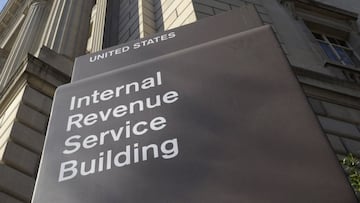Why does the IRS want Americans to file their tax return as soon as possible?
The tax agency has been hamstrung by issues with the returns process, culminating in severe delays for tax refunds and businesses' tax relief.


Americans are being encouraged to file their 2021 tax returns as promptly as possible to avoid facing significant delays. The IRS began tax season 2022 with a huge backlog of unprocessed tax returns from previous years and the agency is calling on filers to do their bit to help.
In a statement released earlier this month IRS Commissioner Chuck Rettig explained: "Planning for the nation's filing season process is a massive undertaking, and IRS teams have been working non-stop these past several months to prepare.”
He continued "The pandemic continues to create challenges, but the IRS reminds people there are important steps they can take to help ensure their tax return and refund don't face processing delays. Filing electronically with direct deposit and avoiding a paper tax return is more important than ever this year.”
Rettig will hope that the warning of delays to long-awaited tax refunds has a positive impact and sees people take advantage of e-filing to get their returns processed swiftly.
Get A Closer Look at challenges faced by the #IRS in 2021 and how the agency is working to serve taxpayers. Commissioner Rettig shares the agency’s 2021 Progress Update. https://t.co/PoqDgABcg4 #IRSCloserLook pic.twitter.com/aA3ZteldU5
— IRSnews (@IRSnews) January 21, 2022
Huge backlog of unprocessed tax returns
Earlier this month National Taxpayer Advocate Erin M. Collins released her Annual Report to Congress for 2021, describing it as "the most challenging year taxpayers and tax professionals have ever experienced."
A central theme of the report was the lengthy delays suffered by many taxpayers, stating that tens of millions of filers experienced delays with their tax returns. Furthermore, 77% of those who were due a tax refund were forced to wait even longer for the payment to arrive as "processing delays translated directly into refund delays."
The IRS is facing a massive backlog as the new tax season begins https://t.co/WG0c1pg28K pic.twitter.com/cs1l6B43Ge
— CNN (@CNN) January 25, 2022
The reason for this, claims the reports, is a significant imbalance between the agency’s workload and resources. Since 2010 the size of the IRS’ workforce has fallen by 17%, while the number of individual tax returns to be filed has grown by 19%.
Backlog causes major issues for the IRS
"While my report focuses primarily on the problems of 2021, I am deeply concerned about the upcoming filing season," Collins wrote. "Paper is the IRS's Kryptonite, and the agency is still buried in it."
Related stories
The cost of the delays is massive and it affects the IRS and the federal government as well as just the individual filers who are forced to wait. As part of the CARES Act passed back in 2020 businesses were able to apply for additional tax relief, known as Alternative Minimum Tax (AMT) credit refunds.
However because of the delays to the tax return process the IRS began to miss its own 90-day statutory requirement for application in September 2020, and continued to do so throughout 2021. This failure was extremely costly for the IRS as it was forced to pay out more than $60 million in interest on top of the tax refunds last year.

